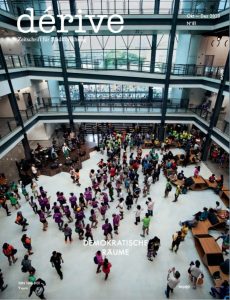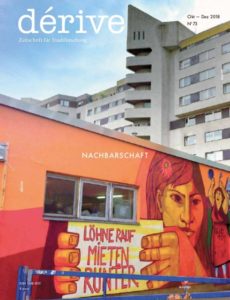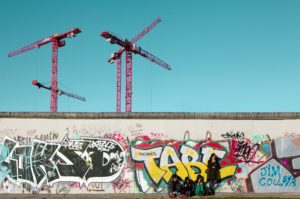After more than a year of intensive work, we are officially concluding the Edu-City project and would like to share some interesting results and reflections with you.
EDU-CITY CONFERENCE
In late January, the Edu-City Conference took place at the Amerika Gedenk Bibliothek under the theme “The Neighborhood as a Learning Environment.” We had the pleasure of hosting engaging presentations from around the globe, sparking lively discussions on the challenges and successes of neighborhood facilitation. The video materials for the presentations are available in our Vimeo channel.
While all presenters contributed valuable perspectives, I would like to highlight two contributions that deeply resonated with me. The first one was from Organ Art Cie, an art company based in Marseille who shared with us the experience of rewriting an ancient Greek theater piece called Les Suppliantes together with neighbors of La Belle de Mai. The original piece by Aeschylus tells the story of a request for asylum from a group of women fleeing the violence of their natal Egypt. The piece explores topics of citizenship, human rights, violence and solidarity in an ancient world with problems not so distant from the ones of contemporary France. The excerpts that they showed us left me astonished and I highly recommend delving into the documentation of their project, available on their website.
Another significant highlight was the presentation by Rahul Srivastava and Antonio Gioia from URBZ, discussing the case of Dharavi in Mumbai and the concept of user-generated cities. Exploring self-construction practices through the lens of visual anthropology as a tool for accompanying and initiating transformation processes was particularly fascinating.
The conference featured very insightful presentations, which I encourage you to take the time to explore calmly and continue the discussion and exchange beyond the conference framework. In addition to these inputs, we also had time to work together in some practical workshops where we exchanged facilitation methods, created a new definition on our Urban Reconnaissance platform – “The intersectional city“, and recorded a final podcast episode to complement the Open Compendium of Practices created by the Edu-City project.
OPEN COMPENDIUM OF PRACTICES
A key result of the Edu-City Project has been the creation of 5 audiovisual story pieces sharing our experiences of community organizing and neighbourhood mediation in Berlin, Sevilla, Sofia, Marseille and Palermo. This Open Compendium can be accessed through the website of Edu-City, where you will find images and audios delving into the processes that we have been part of. These resources have also been transformed into a podcast series broadcast on Cashmere Radio. The first two episodes, featuring Berlin and Seville, are already available online, and the next ones will be broadcast live on Wednesday, 3rd April at 12:00, Wednesday, 1st May at 12:00, and Wednesday, 29th May at 12:00.
DURCH UNSERE AUGEN
And last but not least, we would like to dedicate a few words to the film developed with the support of the Edu-City Labs: „Durch unsere Augen“ – „Through Our Eyes“. This film narrates the stories of a group of arab women living in the area of Mehringplatz. Between anecdotes, everyday activities, joyful encounters and reflections of the past and the future, these women open up to the camera, to each other and to the world. The film is a love letter towards friendship and the concept of home, but also a critique of the challenges that this group of women experience in their everyday life as they integrate and disintegrate into Berlin.
The premiere of the movie took place in a fully booked Hebbel am Ufer, with live music and delicious food. The theater became a home for the neighbors and a platform for the unheard voices that fill every corner of Mehringplatz with life.
The next opportunity to watch the film will be in the Amerika Gedenk Bibliothek, on Friday, 19th of April at 18:00.


